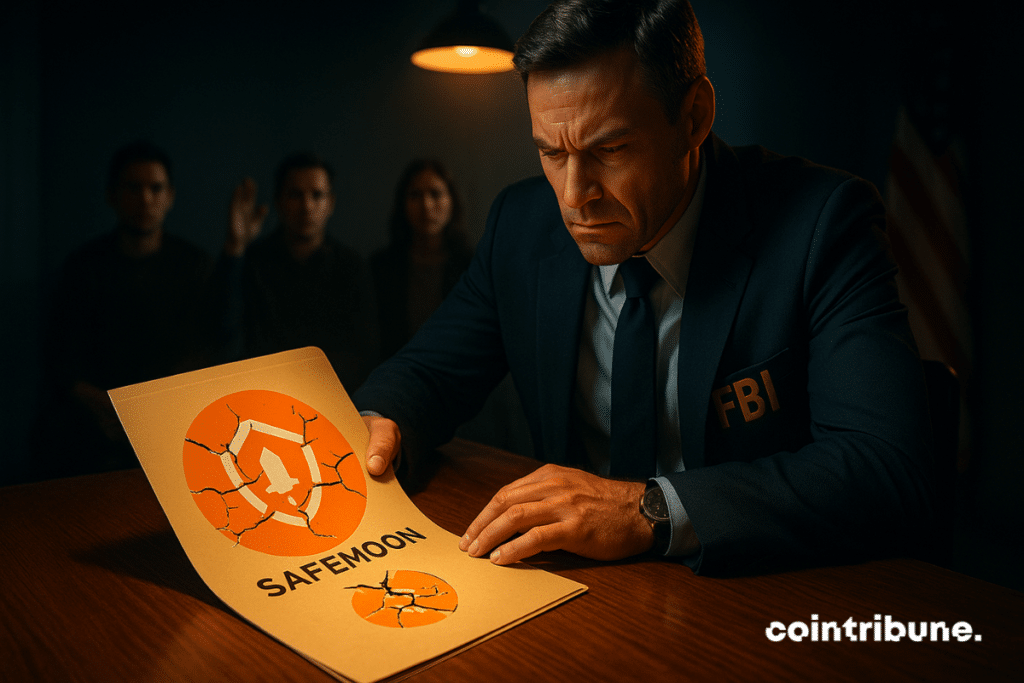SafeMoon : The FBI Seeks Victims After CEO Conviction
The spectacular fall of SafeMoon continues to cause ripples. After the conviction of its CEO for fraud, the FBI now opens its doors to victims to try to recover part of the lost funds. But is restitution in the crypto universe as complex as hoped?

In Brief
- The FBI launches a questionnaire to identify SafeMoon victims eligible for restitution.
- Braden John Karony, SafeMoon CEO, was convicted in May for securities fraud and money laundering.
- Over 200 million dollars were diverted from SafeMoon liquidity pools despite public security promises.
The FBI Launches a Restitution Investigation After SafeMoon’s Collapse
The FBI officially launched last week a questionnaire aimed at injured SafeMoon investors. This initiative follows the May conviction of Braden John Karony, the 29-year-old CEO found guilty of securities fraud and money laundering.
The two-week trial in Brooklyn revealed the extent of the scam. Karony and his co-founders diverted over 200 million dollars from liquidity pools while publicly assuring these funds were “locked and untouchable.” This stark gap between marketing speech and operational reality illustrates the potential abuses in the crypto universe.
The FBI investigation now aims to list and precisely identify victims to grant them the legal status necessary to claim possible restitution. This reflects a broader shift: U.S. authorities are tightening their oversight of DeFi projects, long left in a regulatory gray area.
For Lionel Iruk, senior advisor at Nav Markets, this conviction sends a clear message: promises around liquidity pools must meet the same transparency standards as traditional financial securities.
The SafeMoon case shows that DeFi projects enjoy no immunity from the law, even when relying on smart contracts or decentralized technologies, Iruk reminded Decrypt.
The Titanic Challenges of Crypto Restitution
Despite this judicial victory, fund restitution appears particularly complex. The very nature of cryptocurrencies makes the recovery process of diverted assets much harder than in traditional finance.
First hurdle: loss evaluation. Investors bought SafeMoon tokens at very different prices and times, on a notoriously volatile market.
“This situation makes defining a fair value restitution difficult“, explains Lionel Iruk. How to set the exact amount of damages when a token can lose or gain 50% of its value in a single day?
Second difficulty: fund traceability. Even if authorities seize some assets, their fair redistribution among thousands of holders becomes a real logistical and legal headache.
Many investors do not have complete records of their transactions, further complicating the determination of their eligibility for compensation.
For Wesley Crook, CEO of FP Block, the “volatile, dispersed, and pseudonymous nature” of decentralized finance makes retrospective solutions largely ineffective.
Rather than relying on corrective measures afterwards, he advocates designing systems “intrinsically resistant to manipulation,” capable of protecting investors from the outset.
The SafeMoon case marks a turning point in crypto regulation. It establishes strict legal standards for the entire DeFi ecosystem while revealing the practical limits of justice faced with the technical specificities of decentralized finance. The outcome of this restitution procedure will serve as a large-scale test for the future of legal recourse in the crypto universe.
Maximize your Cointribune experience with our "Read to Earn" program! For every article you read, earn points and access exclusive rewards. Sign up now and start earning benefits.
Passionné par le Bitcoin, j'aime explorer les méandres de la blockchain et des cryptos et je partage mes découvertes avec la communauté. Mon rêve est de vivre dans un monde où la vie privée et la liberté financière sont garanties pour tous, et je crois fermement que Bitcoin est l'outil qui peut rendre cela possible.
The views, thoughts, and opinions expressed in this article belong solely to the author, and should not be taken as investment advice. Do your own research before taking any investment decisions.